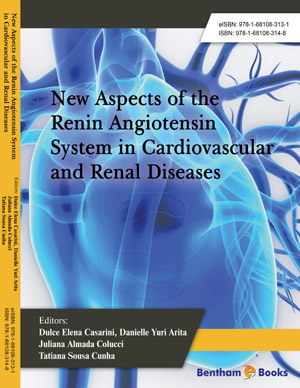Abstract
Since the discovery of renin at the end of 19th century and the identification of angiotensin I (Ang I) and Angiotensin II (Ang II) seven decades ago, reninangiotensin system (RAS) has been widely studied. The RAS is an important endocrine system that regulates blood pressure and fluid homeostasis. This system is composed of peptides, enzymes and receptors. The RAS plays a key role in the development and progression of cardiovascular diseases. In this sense, Ang II is an important peptide of this system, presenting vasoconstrictor and salt-retaining properties and, at cellular level, promoting proliferation, fibrosis and hypertrophy. This chapter focuses on RAS and cardiovascular physiology addressing to an overview about RAS and cardiovascular disease, RAS and its relation with elevated blood pressure, sympathetic overactivity, cardiac hypertrophy, endothelial and vascular dysfunctions, and immune response activation, as well as the physiological basis of RAS inhibitors and cardiovascular disease treatment.
Keywords: Angiotensin-converting enzyme inhibitors, Angiotensin receptor antagonists, Angiotensin II receptor blockers, Autonomic nervous system, Baroreflex, Blood pressure, Cardiac hypertrophy, Cardiovascular diseases, Endothelial dysfunction, Hypertension, Inflammation, Sympathetic nervous system, Vascular resistance.






















